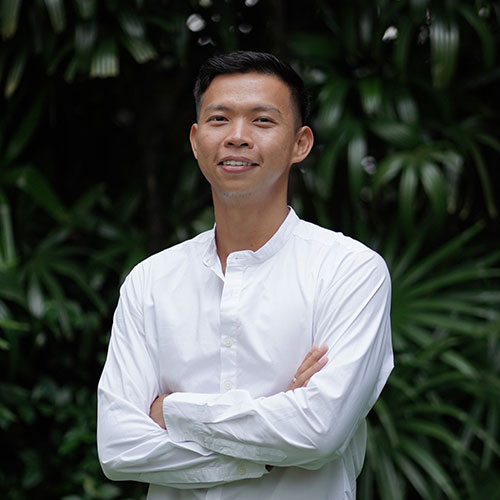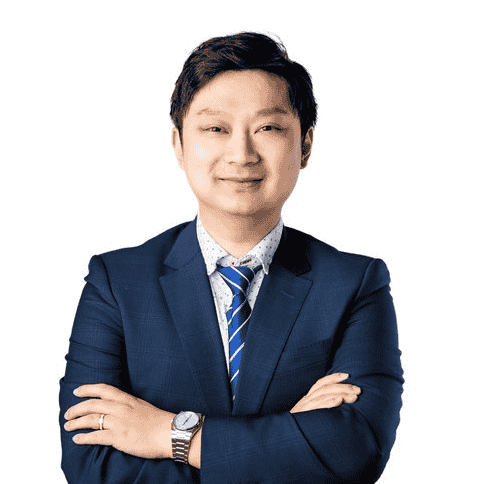How Evoware is turning the tide on Ocean Plastics
In this #MeetTheMB100 interview, Edwin Tan, Co-Founder of Evoware, explains how they are using seaweed to create a viable alternative to petroleum-derived plastics, stopping the flow of ocean-bound plastic packaging in Indonesia.
This interview series is sponsored by EY and Hogan Lovells.
Meaningful Business (MB): Can you tell us a bit about the issues you are trying to solve and why you selected them
Edwin Tan (ET): Indonesia is the second largest source of marine plastic after China, while also home to the second largest group of people in poverty in Asia, who mostly live in east Indonesia. However, we know that Indonesia has 2,000 million km2 of coastline, and is one of largest producers of seaweed in the world. This contradiction triggered us to create our solution – a circular, regenerative ocean-based plastic technology. By doing so, we are tackling the global plastics problem and alleviating poverty, particularly poor seaweed farmers in east Indonesia earning below $2/ day.

Edwin Tan, Co-Founder, Evoware
MB: How is your work tackling those problems, and what impact are you having?
ET: We have three distinct but interrelated business lines all working to reduce marine-bound plastics.
1. Evoware seaweed-based plastic pellets:
The plastic industry has existed for about 160 years. To tackle the problem of plastic pollution, we need to work together with existing players. That is why we developed a patented technology that turns seaweed into plastic pellets for use in industrial plastic machines. In the process, we work with poor communities in east Indonesia who supply us with our raw material, seaweed, achieving a high impact on both the environment and poverty alleviation fronts with low investment needed.
2. Compostable Packaging:
While we do not produce compostable packaging ourselves, we help other innovators scale globally using our Evoware brand. Currently, we have distributors in Australia, Saudi Arabia and Canada, helping to create circular economy solutions through replacing single-use plastics with compostable ones.
3. Rethink Plastic-led collaborations:
The biggest source of plastic waste in the F&B industry in Indonesia is low price food stalls, called Warungs. Through our Rethink Plastic campaign, otherwise known as project Warung Lestari, we give them free packaging to replace plastic use, subsidised by CSR donations from multinational companies. This will help to solve the root cause of plastic waste in Indonesia.
MB: What support do you need in order to scale your business and increase your positive impact?
ET: We require three areas of support in order to expand our impact.
1. Government regulation and subsidy
First and foremost, we need government regulation of single-use plastics. Countries in Europe and North America have prohibited the use of single-use plastics, and although Indonesia is heading in this direction, we need implementation to be accelerated. Additionally, a government subsidy for plastic alternatives will also be beneficial.
2. Partners to scale our technology
We are inviting any scalable plastic manufacturing partners who would be open to collaboration. When single-use plastic regulations are implemented, they will have to work with alternate materials and we believe this transformation can be done together.
3. Investment
We need investment to support our technology and supply chain so we can focus on scaling our impact, and are very open to any investors aligned to this cause.
MB: How do you work with partners and the wider ecosystem to achieve your mission?
ET: Collaboration is one of our core values. We work with the Indonesian government and advise them on plastic regulation. We have also collaborated with 33,000 communities, and are always interested in expanding our community connections.
MB: What is your ambition for the future of your business?
ET: Our end goal is to create a world without plastic pollution. I hope more support such as regulation, funds and partners can work together to make this circular innovation work for all. What we throw out and leave to the ocean will always come back to haunt our bodies in one form or another.
MB: How do you measure success?
ET: Success is derived from team work. It is not individual work. It requires faith, passion and persistence. The end result is not important, instead, the process of building impact is the most critical part. The outcome is just the bonus of how we appreciate every process of our business journey.
Quickfire questions
MB: Tell us a mistake you’ve learned from
ET: Somehow as a leader we think we are the best, based on our various experiences. Trying to listen and be open-minded to different opinions on management are my key learning points. When we combine the energy and strengths of the whole team, it will create better progress and results.
MB: How do you spend your time away from work?
ET: I am a certified mindfulness life coach and holistic health practitioner, and in my spare time, I teach and share the experience so people can find balance and their purpose in life.
MB: What’s the best piece of advice you’ve ever received?
ET: Have trust, have faith, love what you do and this will create synergies at work.
MB: What is something you wish you were better at?
ET: Patience is the golden skill nowadays. I am still learning and practising now. It has been seven years since I started Evoware to try and educate people on plastic pollution and make the world a better place. Progress has not always been as quick as I envisioned or expected, and patience is really needed in sectors like ours, where education and collaboration are key to success.
MB: What is the one book everyone should read?
ET: Just Breath from Dan Brule. To be an entrepreneur, we need to breathe properly. When we have better lungs, better health, our energy will be good and we can attract positive things in life.
Discover the other leaders recognised on the 2022 MB100, for their work combining profit and purpose to help achieve the United Nations Global Goals, here.








